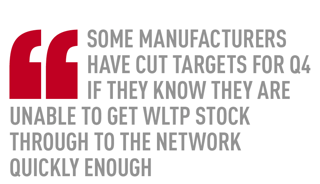The September 1 introduction of Worldwide Harmonised Light Vehicle Test Procedure (WLTP) has been blamed for a 20% slump in car dealership profits during the key ‘plate-change month.
New vehicle supply issues stemmed the flow of vehicles into many manufacturer brands dealer networks in what is normally the second most profitable month of the year, resulting in an average return on sales (RoS) figure of 0.91%, according to ASE.
 ASE director Mike Jones revealed that overall profits for September had declined by £20,000 year-on-year, resulting in a decline in profits for the quarter as a whole.
ASE director Mike Jones revealed that overall profits for September had declined by £20,000 year-on-year, resulting in a decline in profits for the quarter as a whole.
In his annual report on car retailer performance and efficiency, Jones noted that the switch to WLTP and resulting demands on vehicle homologation which affected many brand’s supply chains had impacted the month’s usual pre-registration activity.
ASE reported a 35% decline in last-day registrations compared to the same period in 2017.
Jones said that this could “bode well” for used car profitability in Q4 and 2019, however.
Aftersales performance was hit by the lower demands on retailers PDI operations during September.
Jones said: “Given the temporary nature of the change most retailers chose not to alter staffing levels, instead showing a 4% drop in service efficiency levels for the month.”
Jones added that the September supply issues could bring about a bumper December for some franchised retailers as their supply of vehicles frees up.
However, he added that the issues might not come so quickly for others, adding: “It looks like this will not take place for many until March 2019.”
 How has the introduction of WLTP affected your franchised car dealership? Click the tab to tell AM about your dealership's experience of managing the shift to WLTP and RDE fuel economy and emissions test regimes by taking this month's 'one minute' multiple-choice survey.
How has the introduction of WLTP affected your franchised car dealership? Click the tab to tell AM about your dealership's experience of managing the shift to WLTP and RDE fuel economy and emissions test regimes by taking this month's 'one minute' multiple-choice survey.
> Track dealer performance KPIs



















David Smith - 07/11/2018 20:34
Why do you and manufacturers continue with a 3% benchmark on ROS when no one but the manufacturer has seen anything close for over a decade